With Christmas before the gates and eager kids all over the world hoping for gifts from Santa Claus, as a reward for their good behavior, Kaspersky Lab's research shows in which countries children show the most dangerous online behavior, of the last 12 months.
Based on global statistics from the unit Kaspersky Lab Parental Control, the survey shows that the most attempts to visit dangerous websites by underage users were recorded in Israel (775 attempts), followed by the UK (460), the USA (352), Sweden (345) and Canada (302).
Greece was in 29 position with 92 recorded attempts.
This survey covers the period from December 2015 to November 2016 and includes data gathered from Kaspersky Lab's security and Parental Control enabled programs into Windows and Mac OS X. The statistics are based on the number that records the attempts visiting websites that fall under the seven default categories * that are considered as the most dangerous for children by Kaspersky Lab specialists. Statistics are presented as a number with total attempts per user per year.
The survey results show that Japanese children are more likely to try to visit websites that belong to the categories of "Mature content" (39 attempts) and "Software, sound, video' (104) – the last category includes websites with unlicensed content. Also of interest is the fact that young Italians are more interested in gambling (3,6 attempts), while Portuguese youth more often visit websites that use vulgar language (60 attempts). Children from Israel showed more interest in websites promoting alcohol, tobacco products and/or drugs (687 attempts per user), but also weapons (3,8), while most attempts to visit websites with violent content (1,8) were done by young people in the USA. Children in Greece showed more interest in websites with content unsuitable for minors (14 attempts per user), while the other categories did not show any significant number of attempts.
Nevertheless, and to be more righteous, it is worth noting that all these attempts are not always advisable. For example, children can end up on these websites by accidentally clicking on a banner or a link that has been shared by another user. At the same time, another survey conducted by Kaspersky Lab in 2016, involving 3.780 families from seven (7) different countries, showed that young Russians and Americans were more likely than other children to hide from their parents any incriminating elements of their dangerous activity on the Internet, and to use child-friendly content.
"Knowledge is a force, as the well-known saying goes, and this is especially true for parents who now have an obligation to protect their children from unwanted and sometimes dangerous information, both in the real world and in the virtual world, comments Dragan Martinovic, Eastern Europe Managing Director of Kaspersky Lab.
"A mother or father can not always be next to his child to prevent a random online encounter, say pornographic content or websites that promote drug use. This is the most important reason that specialized IT solutions offer important service by alerting parents and helping prevent their children from visiting websites with such content. "
Unfortunately, Santa Claus was not available to comment.
*The categories of websites that can be blocked by the Parental Control module of Kaspersky Lab security programs are: adult content, alcohol, tobacco products, drugs, electronic games, electronic commerce, inappropriate/vulgar language, gambling and betting, lotteries and sweepstakes, HTTP redirect requests, online communications, searches work, ειδησεοgraphics media, religions, religious organizations, software, audio, video, violence, weapons, explosives, fireworks.
The statistics presented in this press release include 7 categories: adult content, alcohol, tobacco products, narcotics, inappropriate language, gambling and betting, lotteries and draws, software, audio, video, violence, weapons, explosives and fireworks .





